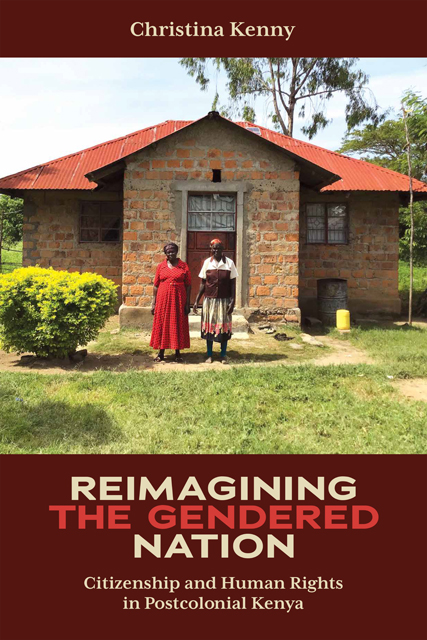Book contents
- Frontmatter
- Dedication
- Contents
- List of Illustrations
- Acknowledgements
- Note on Ethnic Identities
- List of Abbreviations
- Introduction
- 1 The Kenya Colony in British East Africa: A History of Ethno-patriarchy
- 2 Bodies as Battlefields, Bodies as Weapons: The Colonial Regulation of Women’s Bodies
- 3 Myths of Sorority: Kenyan Women’s Community Organisation
- 4 Everyday Violence: Violence against Women during Elections and Times of Peace
- 5 Gendered Citizenship, Politics and Public Space: Women’s Participation in Government
- Conclusion
- Appendix: Field Work, Focus Groups and Interviews
- Bibliography
- Index
- Eastern Africa Series
4 - Everyday Violence: Violence against Women during Elections and Times of Peace
Published online by Cambridge University Press: 17 December 2022
- Frontmatter
- Dedication
- Contents
- List of Illustrations
- Acknowledgements
- Note on Ethnic Identities
- List of Abbreviations
- Introduction
- 1 The Kenya Colony in British East Africa: A History of Ethno-patriarchy
- 2 Bodies as Battlefields, Bodies as Weapons: The Colonial Regulation of Women’s Bodies
- 3 Myths of Sorority: Kenyan Women’s Community Organisation
- 4 Everyday Violence: Violence against Women during Elections and Times of Peace
- 5 Gendered Citizenship, Politics and Public Space: Women’s Participation in Government
- Conclusion
- Appendix: Field Work, Focus Groups and Interviews
- Bibliography
- Index
- Eastern Africa Series
Summary
Following the contested result of the 2007 elections, tens of thousands of Kenyans were sexually and physically assaulted, driven from their homes and communities, and in some cases murdered by their fellow Kenyans and state security forces. Although this violence was unprecedented in scale, intercommunal and state violence has accompanied all of Kenya’s post-independence elections. In addition, Kenyan women have been dealing with interpersonal violence and institutional failures of security and other state institutions for decades before the 2007 elections. I argue here that the catastrophic 2007 election violence needs to be understood within the context of the high levels of normalised interpersonal and institutional violence that many Kenyan women contend with throughout their lives.
Outside the election cycle, interviews I conducted with women in Bar Ober and Butere (60km north-west of Kisumu) illustrate the challenges women routinely face in dealing with intimate partner violence, theft, police corruption and denial of basic health care. These discussions present these women’s own assessment of the utility of the strategies available to them to address these significant and ongoing challenges. I then examine the ways in which women’s experiences of post-election violence are represented by the Kenyan national human rights sector and assess the utility of the recommendations made by these organisations. Although local human rights advocates and organisations are aware of the fundamental limitations of law enforcement, primary health care and other social welfare services, they continue to recommend that women employ strategies that the women themselves understand to be ineffective at best and which, at worst, may create new risks to the women’s physical safety. By tracing the threat of violence in peacetime through to the violence experienced in times of national crisis, we can see that the memories, strategies and expectations of peacetime violence are imbricated in the violence of the crisis. This analysis also examines the aims and outcomes of the liberal peacebuilding process, which reinforce rather than problematise institutional and cultural power imbalances, including ethno-patriarchal and neocolonial power structures and constricting gender roles, as we have seen in previous chapters.
This chapter begins with the return to multiparty democracy in 1992 and an overview of the elections in the late-modern period (1992, 1997 and 2002), focusing on the treatment of women candidates and the minimal representation women achieved at these elections.
- Type
- Chapter
- Information
- Reimagining the Gendered NationCitizenship and Human Rights in Postcolonial Kenya, pp. 108 - 150Publisher: Boydell & BrewerPrint publication year: 2022



